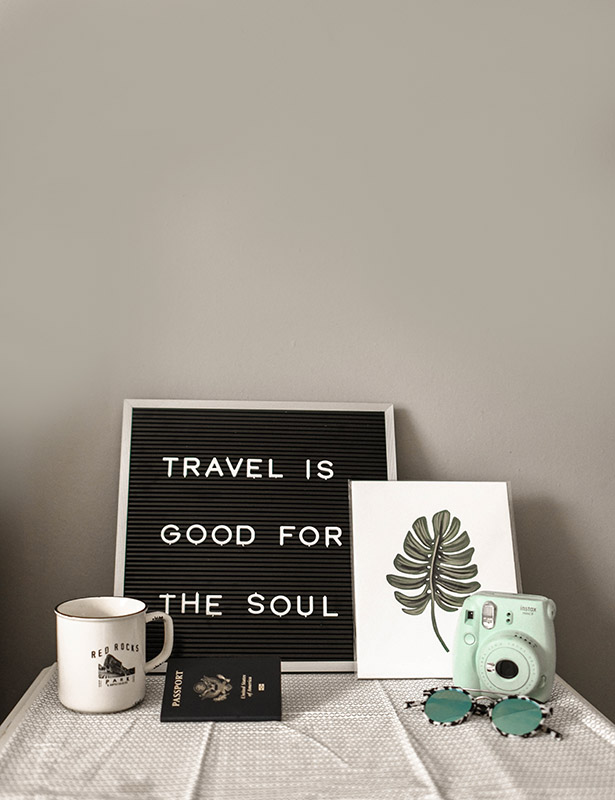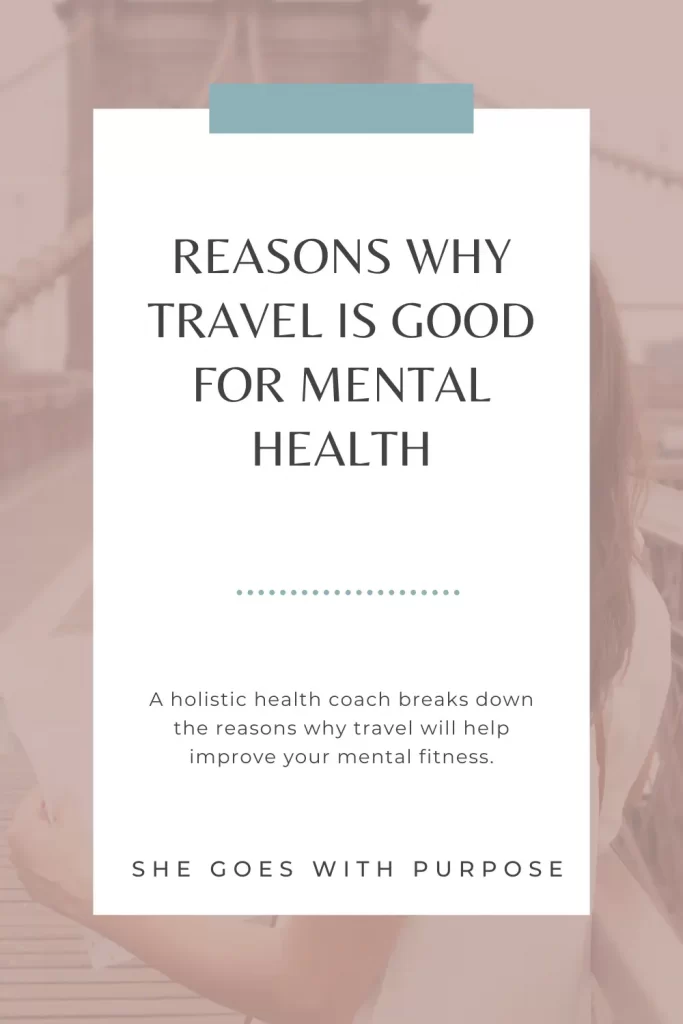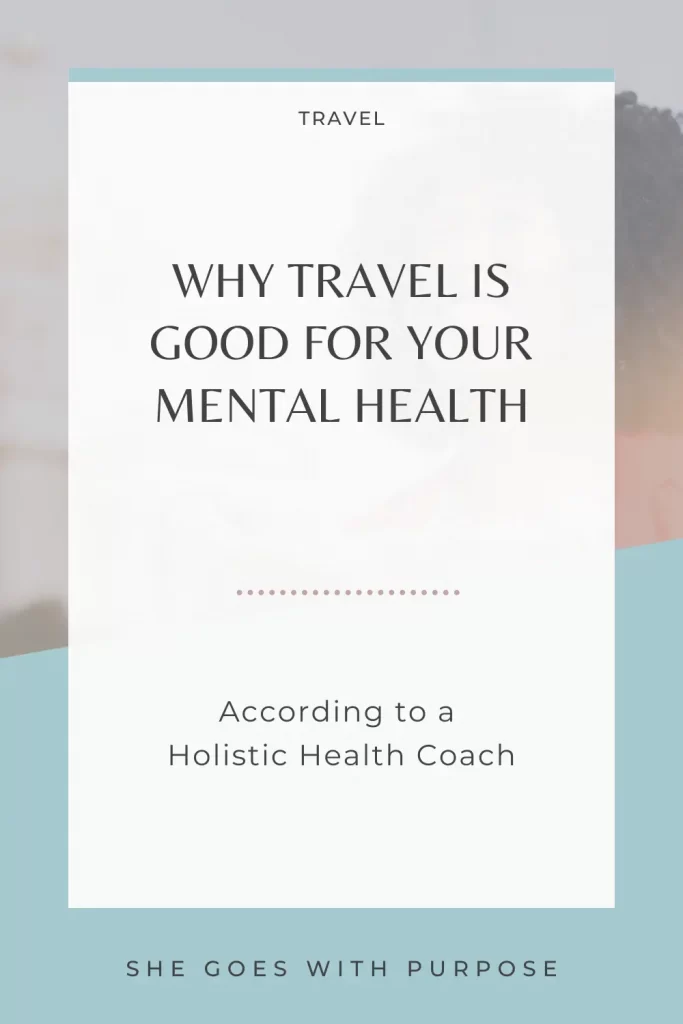Why Travel Is Good for Mental Health According to a Holistic Health Coach
Traveling. It’s fun, right?
We see new places, meet new people, and are exposed to different ways of life when we travel. Sometimes we might engage in fun adventure sports we wouldn’t normally try at home. Or try out new foods and enjoy different geographies and climates.
So, we can all agree: there are many benefits to traveling. However, is it fair to say that traveling can actually be good for you?
This is a question I reflected on after my friend Brittany kicked off the first version of this blog, Transformed Thru Travel. She shared stories of women who say travel helped them with depression, panic attacks, and overcoming an eating disorder. She also shared her own story about how traveling helped her overcome her anxiety.

I got a taste of this personally when I arranged to meet Brittany in Austin, Texas a few years ago. We miscommunicated our travel dates, and as a result, I arrived in Austin a day early.
In those 24 hours, I was forced to push myself outside of my comfort zone. I had to learn how to get myself around, find places to eat, and just be completely by myself. For the first time in quite a while.
To be honest, it was anxiety-provoking at times. However, it taught me how to push through that anxiety and to be a more assertive person.
As a holistic health coach and psychotherapist, I’ve heard similar stories from clients. Women with anxiety often tell me that their travel experiences completely re-frame their experience of anxiety and their perspective on life.
Which got me thinking, why is that?
As a psychotherapist, I’ve had years of formal training and graduate school courses on how to help people change. And yet, I had clients, who I worked with for years, come back from travel experiences with new insights and attitudes that we had yet to achieve in therapy.
After some reflection and a few “a-ha” moments, I’ve finally been able to pinpoint a few reasons why this is the case.

1. Travel forces you to confront your feelings of stress and anxiety head-on, in real-time.
In psychotherapy or life coaching, you do a lot of talking about your problems. Hopefully, you also do some problem-solving. However, it’s challenging for your therapist or coach to force you to actually confront those problems.
Because traveling puts you outside of your comfort zone, it forces you to recognize how your anxiety shows up. In turn, you learn what you can do about it.
In therapy terms, we would call this “in-vivo” exposure. Meaning that you are exposed to your anxiety in very real ways. Versus in imagined scenarios or by talking about past events.
2. Travel exposes you to your anxiety so that your body can learn how to let it pass naturally.
In therapy, we would call this exposure therapy. It’s common in the treatment of disorders like Obsessive-Compulsive Disorder (OCD) or phobias.
The idea in exposure therapy is that all anxiety eventually subsides with enough exposure to the trigger. The problem, however, is that most people avoid things that make them anxious.
I often use the analogy of jumping into a cold pool of water. When you first jump in, the water might be freezing. After a few minutes, our bodies adjust and the water temperature feels just fine. When you have anxiety, you avoid what makes you uncomfortable, which is like jumping in and out of the pool over, and over, and over again. This feels like torture and eventually might just cause you to avoid going in the pool altogether.
When we travel and get outside of our comfort zones, it gives us the opportunity to feel some mild anxiety without the ability to avoid it. This allows our body to realize that, in time, the anxiety naturally passes, and therefore our relationship with anxiety changes. The more we do this, the less severe our anxiety becomes, and it lasts for shorter periods of time.

3. Travel helps decrease our susceptibility to negative emotions.
As a therapist, I’ve done a good amount of training in Dialectical-Behavioral Therapy (DBT). DBT is a style of therapy originally developed to treat Borderline Personality Disorder. Research also shows it to be effective in treating depression, binge-eating disorder, post-traumatic stress disorder, bipolar disorder, and substance abuse.
To be honest, I’ve seen DBT be helpful in the treatment of just about anything. Since the basic premise is to learn how to balance acceptance with change, and to cultivate skills to improve your quality of life.
One skill that I teach clients is called “ABC PLEASE”. It teaches people things they can do to reduce their vulnerability to negative emotions. I won’t go over the whole skill but I do want to highlight the “A” and the “B” portion.
“A” stands for accumulating positive emotions and experiences.
This stems from the idea that our emotional health is like a savings account – the more deposits we put into our account, the less likely we are to become over-drafted.
Traveling allows us to “fill up” our emotional savings accounts so that when stressful situations come our way, they are less likely to have a big impact on us.
“B” stands for building mastery.
This relates to anything you do that makes you feel proud and accomplished.
When we travel to a foreign country and attempt to utilize the language, or effectively navigate its streets or public transportation, we feel proud of our ability to do that. This, in turn, creates feelings of well-being and empowerment and helps to increase our confidence. Over time, the mastery we build helps us develop stronger self-esteem, and therefore, we become less susceptible to negative self-talk and anxious thoughts.

In Conclusion
Travel has many benefits. It can be pleasurable. It can help you learn new things. And, perhaps most importantly, it can help you learn more about yourself and overcome some of your challenges.
If you’re a long-time traveler who has noticed an improvement in your stress and anxiety levels, then hopefully you understand a little more about why travel has been so helpful. If this is the case, please don’t hesitate to shoot me an e-mail and share your story! And if you’re considering traveling, then I hope you see some of its potential benefits.
Holistic health means utilizing all the available resources at your disposal. Travel can be a very valuable tool to add to your toolkit!
About the Author
Nikolai Blinow is a holistic health coach. She specializes in helping people-pleasing, performance-oriented, and perfectionistic personalities move from a life of burnout to a life of balance.
Watch her TEDx talk about yoga and its connection to mental health.
My Health & Wellness Resources page contains helpful sites, phone numbers, and information for anyone needing mental health + wellness assistance.
SAVE THIS POST FOR LATER!


I want to express my gratitude to this writer who writes very well and cover all the information on the topic.
Amazing tips. Eat healthy, inhale fresh air, sleep well, practice yoga or meditation for better mental health. Try to keep your home and surroundings clean.
Yes, I agree – all those things!